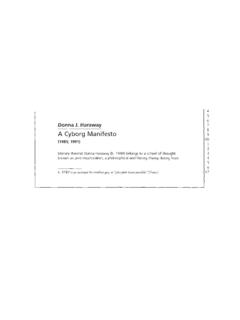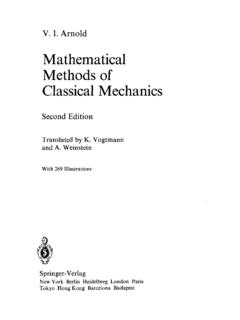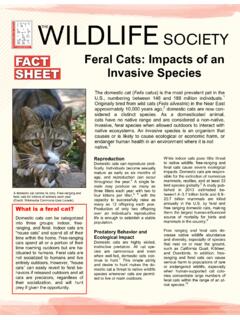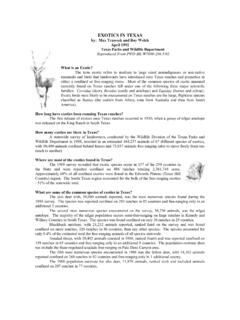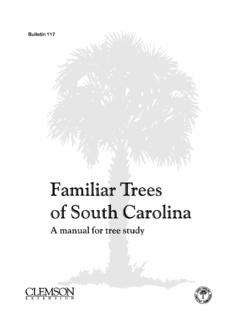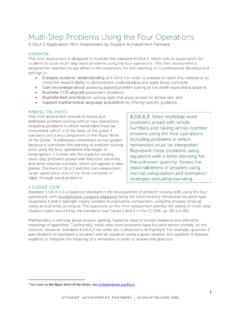Transcription of Compulsory Heterosexuality and Lesbian Existence
1 Available at Compulsory Heterosexuality and Lesbian Existence Adrienne rich Adrienne rich 's essay constitutes a powerful challenge to some of our least examined sexual assumptions. rich turns all the familiar arguments on their heads: If the first erotic bond is to the mother, she asks, could not the "natural" sexual orientation of both men and women be toward women? rich 's radical questioning has been a major intellectual force in the general feminist reorientation to sexual matters in recent years, and her conception of a " Lesbian continuum" sparked especially intense debate. Does lesbianism incorporate all support systems and intense interactions among women, or is it a specifically erotic choice? What is gained and what is lost with the second, narrower definition? rich 's assumptions also usefully raise the more general theoretical question: Is adult sexuality so closely associated with the infant bond that genuinely satisfying sex relations are likely to be structured primarily around nurturance?
2 I. Biologically men have only one innate orientation--a sexual one that draws them to women--while women have two innate orientations, sexual toward men and reproductive toward their young.(1). I was a woman terribly vulnerable, critical using femaleness as a sort of standard of yardstick to measure and discard men. Yes--something like that. I was an Anna who invited defeat from men without ever being conscious of it. (But I am conscious of it. And being conscious of it means I shall leave it all behind me and become--but what?) I. was stuck fast in an emotion common to women of our time, that can turn them bitter, or Lesbian , or solitary. Yes, that Anna during that time was .. [Another blank line across the page:](2). The bias of Compulsory Heterosexuality , through which Lesbian experience is perceived on a scale ranging from deviant to abhorrent, or simply rendered invisible, could be illustrated from many other texts than the two just preceding.
3 The assumption made by Rossi, that women are "innately sexually oriented" toward men, or by Lessing, that the Lesbian choice is simply an acting-out of bitterness toward men, are by no means theirs alone; they are widely current in literature and in the social sciences. I am concerned here with two other matters as well: first, how and why women's choice of women as passionate comrades, life partners co-workers, lovers, tribe, has been crushed, invalidated, forced into hiding and disguise; and second, the virtual or total neglect of Lesbian Existence in a wide range of writings, Including feminist scholarship. Obviously there is a connection here. I believe that much feminist theory and criticism is stranded on this shoal. My organizing impulse is the belief that it is not enough for feminist thought that specifically Lesbian texts exist.
4 Any theory or cultural/political creation that treats Lesbian Existence as a marginal or less "natural" phenomenon, as mere "sexual preference," or as the mirror image of either heterosexual or male homosexual relations is profoundly weakened thereby, whatever its other contributions. Feminist theory can no longer afford merely to voice a toleration of "lesbianism" as an "alternative life-style," or make token allusion to lesbians. A feminist critique of Compulsory heterosexual orientation for women is long overdue. In this exploratory paper, I shall try to show why. I will begin by way of examples, briefly discussing four books that have appeared in the last few years, written from different viewpoints and political orientations, but all presenting themselves, and favorably reviewed, as feminist.(3) All take as a basic assumption that the social relations of the sexes are disordered and extremely problematic, if not disabling, for women; all seek paths toward change.
5 I have learned more from some of these books than from others; but on this I am clear: each one might have been more accurate, more powerful, more truly a force for change, had the author felt impelled to deal with Lesbian Existence as a reality, and as a source of knowledge and power available to women; or with the institution of Heterosexuality itself as a beachhead of male dominance.(4) In none of them is the question ever raised, whether in a different context, or other things being equal, women would choose heterosexual coupling and marriage; Heterosexuality is presumed as a "sexual preference" of most women," either implicitly or explicitly. In none of these books, which concern themselves with mothering, sex roles, relationships , and societal prescriptions for women, is Compulsory Heterosexuality ever examined as an institution powerfully affecting all these; or the idea of "preference" or "innate orientation" even indirectly questioned.
6 In For Her Own Good 150 Years of the Experts' Advice to Women by Barbara Ehrenreich and Deirdre English, the authors' superb pamphlets, Witches, Midwives and Nurses: A. History of Women Healers, and Complaints and Disorders: The Sexual Politics of Sickness, are developed into a provocative and complex study Their thesis in this book is that the advice given American women by male health professionals, particularly in the areas of marital sex, maternity, and child care, has echoed the dictates of the economic marketplace and the role capitalism has needed women to play in production and/ or reproduction. Women have become the consumer victims of various cures, therapies, and normative judgments in different periods (including the prescription to middle-class women to embody and preserve the sacredness of the home--the "scientific".)
7 Romanticization) of the home itself). None of the "experts' " advice has been either particularly scientific or women-oriented; it has reflected male needs, male fantasies about women, and male interest in controlling women--particularly in the realms of sexuality and motherhood--fused with the requirements of industrial capitalism. So much of this book is so devastatingly informative and is written with such lucid feminist wit that I kept waiting as I read for the basic prescription against lesbianism to he examined It never was. This can hardly be for lack of information. Jonathan Katz's Gay American History(5) tells us that as early as 1656 the New Haven Colony prescribed the death penalty for lesbians. Katz provides many suggestive and informative documents on the "treatment" (or torture). of lesbians by the medical profession in the nineteenth and twentieth centuries.
8 Recent work by the historian Nancy Sahli documents the crackdown on intense female friendships among college women at the turn of the present century(6) The ironic title For Her Own Good might have referred first and foremost to the economic imperative to Heterosexuality and marriage and to the sanctions imposed against single women and widows--both of whom have been and still are viewed as deviant Yet, in this often enlightening Marxist-feminist overview of male prescriptions for female sanity and health, the economics of prescriptive Heterosexuality go unexamined.(7). Of the three psychoanalytically based books, one, Jean Baker Miller's Toward a New Psychology, of Women, is written as if Lesbians simply do not exist, even as marginal beings Given Miller's title I find this astonishing. However, the favorable reviews the book has received in feminist journals, including Signs and Spokeswoman, suggest that Miller's heterocentric assumptions are widely shared In The Mermaid and the Minotaur Sexual Arrangements and the Human Malaise, Dorothy Dinnerstein makes an impassioned argument for the sharing of parenting between women and men and for an end to what she perceives as the male/female symbiosis of "gender arrangements," which she feels are leading the species further and further into violence and self-extinction.
9 Apart from other problems that I have with this book (including her silence on the institutional and random terrorism men have practiced on women--and children-- throughout history, amply documented by Barry, Daly, Griffin, Russell and van de Ven, and Brownmiller, (8) and her obsession with psychology to the neglect of economic and other material realities that help to create psychological reality), I find utterly a historical Dinnerstein's view of the relations between women and men as "a collaboration to keep history mad" She means by this, to perpetuate social relations that are hostile, exploitative, and destructive to life itself. She sees women and men as equal partners in the making of "sexual arrangements," seemingly unaware of the repeated struggles of women to resist oppression (our own and that of others) and to change our condition.
10 She ignores, specifically, the history of women who as witches, femmes seules, marriage resisters, spinsters, autonomous widows, and/or lesbians--have managed on varying levels not to collaborate. It is this history, precisely, from which feminists have so much to learn and on which there is overall such blanketing silence. Dinnerstein acknowledges at the end of her book that "female separatism," though "not on a large scale and in the long run wildly impractical," has something to teach us: "Separate, women could in principle set out to learn from scratch--undeflected by the opportunities to evade this task that men's presence has so far offered--what intact self-creative humanness is."(9) Phrases like "intact self-creative humanness'' obscure the question of what the many forms of female separatism have actually been addressing.

